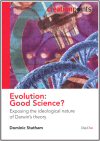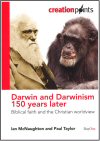Day One CreationPoints Collection (3 vols.)
Digital Logos Edition
Overview
The Day One CreationPoints Collection examines both sides of the origins argument. While school administrators and the media focus primarily on supporting evidence for Darwinism, this collection discusses the truths and flaws in the theory from a scientific and Christian viewpoint. The volumes in this collection help you dig deeper into the origin discussion by discussing key theories in the galactic and universal-origin discussion. Hear from multiple authors about the validity of the most common origin theories.
The Logos edition makes researching creation theory fast and easy. Powerful search options allow you to find what other authors and scholars are saying. The Day One CreationPoints Collection integrates seamlessly into your digital library, saving you time and equipping you with the research tools you need to enter confidently into the creation debate.

- Analysis of key evolutionary theories from both scientific and Christian perspectives
- Evaluation of Darwin’s famous theories
- Encouraging ideas on how to grasp the origin of life
- Evolution: Good Science? by Dominic Statham
- Darwin and Darwinism 150 Years Later by Ian McNaughton and Paul Taylor
- What about Origins? by A. J. Monty White

Darwin’s theory of evolution is often presented as scientifically proven fact—in schools, in universities, and by the media. Few are aware, however, that there are very serious problems with Darwin’s theory. This is because students and the general public are only told about the evidence that appears to support it; little is said about the many scientific observations that seriously undermine it.
Using clear writing, Dominic Statham explains the main arguments presented by evolutionists in support of their theory and shows that these have major flaws. He argues that much of the scientific data can actually be seen to be consistent with a biblical account of creation and history. He concludes that, rather than being scientifically driven, the theory of evolution is driven by a desire to justify the belief that life on earth arose by natural processes rather than by the hand of God. Finally, the reader is encouraged to hold fast to the Bible as the true revelation of God, his creation, and his dealings with mankind.
This book presents an excellent summary of the origins debate. As an experienced engineer, Dominic Statham is well qualified to take on the task of analyzing a mass of disputed evidence and making conclusions that are fair and justified.
—Stuart Burgess, professor of design and nature, University of Bristol
Dominic Stratham is a chartered engineer and graduate of Loughborough University in the UK. He has 25 years of experience in aeronautical and automotive engineering, with Rolls Royce (Aero and Industrial & Marine Divisions) and GKN, a leading supplier of automotive driveline components. His recent vehicle projects include Land Rover Discovery 3, Freelander 2 and the Jaguar XF. He has extensive experience of both manufacturing and product development, and holds a number of patents.

In 1859, Charles Robert Darwin (1809–1882) published On the Origin of Species by Means of Natural Selection: or, the Preservation of Favoured Races in the Struggle for Life. It has affected the worldview of generations since, encouraging them to think that they are the products of an unplanned process and ultimately have no reason for existence. The book has had an incredible effect on western society and has never been out of print since the first edition of 1,250 copies was sold out the first day. Why was the Origin of Species so popular? It is likely the UK public were ready to embrace an alternative to the biblical creation account. The new spirit of the age was one of unbelief, despite religious revivals in Scotland and Ireland. There are two strands to Darwinism. The first states that all life evolved over long time periods from a single prototype cell. The other is the notion of “natural selection.” This book reviews Charles Darwin’s religious ideas and questions his evolutionary claims in the light and authority of the Bible, which sets forth a worldview consistent with faith in God.
In this book, Paul Taylor and Ian McNaughton show how the evolutionary philosophy changed the scientific outlook and paradigm of the nineteenth and twentieth century. What they also show is the movement away from solid foundations in Darwin’s ancestors who were heavily influenced by Unitarianism and then in Darwin’s life to a movement right away from trust in the authority of God’s Word. Evolutionary thinking was spawned in unbelief and only by a return to a Biblical Creation viewpoint can one again understand properly the message of the Scriptures and the teaching of the Fall and Redemption.
—Andy McIntosh, professor, University of Leeds
This excellent book clearly explains how Darwin’s humanistic worldview, rather than scientific evidence, was the main motivating factor behind the theory of evolution. The book also explains how theistic evolution is not a reconciliation of science with the Bible but rather a damaging union of humanism and the Bible.
—Stuart Burgess, professor of design and nature
Ian McNaughton is the chairman of Answers in Genesis (UK/Europe). He studied theology at the Free Church of Scotland College, Edinburgh, and earned his ThM in historic theology from Westminster Theological Seminary. He has served as a pastor in FIEC Churches for over 30 years and now pastors West Worthing Evangelical Church, West Sussex.
Paul Taylor spent 17 years teaching science in state schools, eventually becoming head of the department and gaining a master’s degree in science education at Cardiff University. His first book, Just Six Days, arranged contemporary creationist thinking into biblical order as a commentary of Genesis chapters 1 to 11. Paul joined Answers in Genesis in August 2005 as a writer and speaker. He is a regular contributor to the AIG website and Answers Magazine, and is often published in various Christian magazines.

This book deals with some of the questions that have taxed the minds of scientists and philosophers for centuries—the origins of the universe, Earth, of life, species, humans. In What about Origins? A. J. Monty White shows that the evolutionary explanations that try to explain origins are invariably weak and are unsupported by the scientific data. He argues that the ultimate answers to the questions of origins are to be found only in the Bible. It is in the Bible that we discover the answers not only about who is responsible, but also about the methods employed, when everything originated, and most importantly, why.
What about Origins? is a book designed to challenge those who think there is little, if any, evidence for the biblical account of creation, and to encourage those who just want supporting facts about creation and a way to share it with their friends. Dr. Monty White both accepts and defends biblical creation unashamedly and will challenge you to do so, as well as equip you to expose evolutionist error.
—John Mackay, international director, Creation Research
A. J. Monty White converted to Christianity from atheism in 1964, when he was an undergraduate student at Aberystwyth. He studied chemistry and geology, obtaining his PhD in 1970.
This title is included in the following collections
You can save when you purchase this product as part of a collection.
Logos 8 Portfolio Legacy Libra...
$4,749.99$4,749.99Logos 7 Baptist Portfolio Lega...
$4,749.99$4,749.992025 Collector's Edition Libra...
$10,999.99$8,249.99Logos 8 Collector's Edition Le...
$11,399.99$11,399.99
- $11,399.99
- $11,399.99
- $23,999.99$17,999.99
- $21,749.99
- $24,999.99
Reviews
1 rating

Dr. Doug Lane
8/26/2013
Ken Sherwood
5/10/2013
I know this is trite, but we are dealing here with Creation over evolution and I discover that the book "What about Origins" was published in 20010! I know it was 'cos it says so above. I realise that the Aberystwyth air is reputed to be bracing but it seems to have extended his life span to the point where he will probably be desperate to attain his ultimate rest.